There’s a scene in season three of The Wire, where Brother Mouzone is in a barber shop, talking to Avon Barksdale about Stringer Bell.1 Barksdale offers money to Mouzone to rectify the situation and perhaps save Bell. When Mouzone seems confused by the monetary offer, Barksdale attempts to explain, “This is business.”
Without missing a beat, Mouzone corrects him, “Business is where you are now, but what got you here was your word and your reputation. With that alone, you’ve still got an open line to New York; without it, you’re done.”
There is a long pause as the two men look at each other, but it is clear from Barksdale’s face2 that he understands that he has to give up Bell. Anything short of that would make his word meaningless and destroy his reputation with the people he relies upon to keep him in power.
One of the constant themes of the The Wire, in fact, was the different relationships with truth that various groups of people were able to have. The everyday folks (drug dealers and stick-up boys included) had to be honest, because it was such a short jump from getting caught in a lie3 to being killed. The police were allowed to lie for the sake of clearing crimes, because that made their higher-ups look better, but lying to the higher-ups was fatal to careers.
The politicians on the show, however, were allowed to lie with impunity. Of course, the “dishonest politician who says anything to get a vote” is a TV trope nearly as old as the medium itself. What The Wire did differently was to start from an implied idea that politics only attracts the kind of people who, whether they knew it about themselves or not, would be comfortable with lying to people for the politician’s own benefit. The aspirational folks who could not get comfortable with the dishonesty could not win in the political world of The Wire.
Now, I don’t necessarily think that The Wire’s nihilistic view of politics is completely accurate. Nobody is perfect, but I am sure that some politicians genuinely do try to be honest and transparent, both as candidates and once elected.
Frank Scott, Jr., does not appear to one of those.
Since Scott first started running for Little Rock Mayor, he has touted “transparency” over and over as one of his core beliefs about governing. He repeated this in his inaugural speech, when he said, “As your mayor, I will lead in a manner that embraces transparency with your demands front of mind and your perspectives at the table.” He has continued to echo this “transparency” mantra since taking office as well, repeatedly referenced his “ACT plan,” which he says stands for “accountable, clear, and transparent.”
In fact, he specifically mentioned the “ACT plan” on the website for his occasional walks around Little Rock with members of the community.
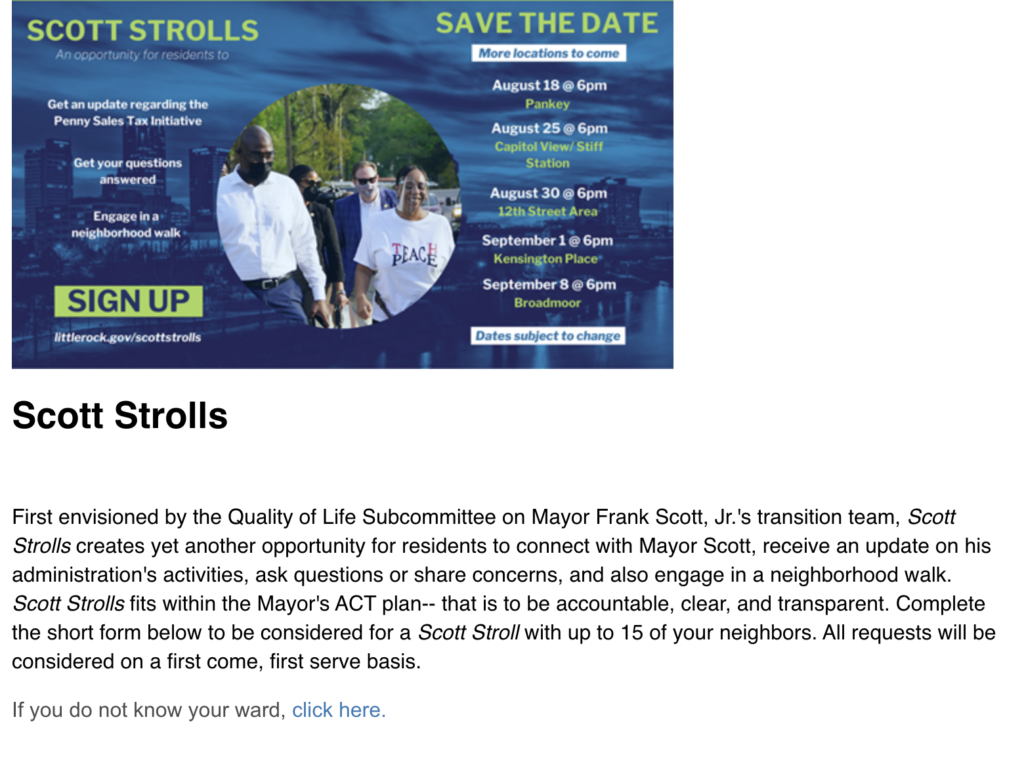
I first heard about these “Scott Strolls” on August 16, when I saw this tweet:
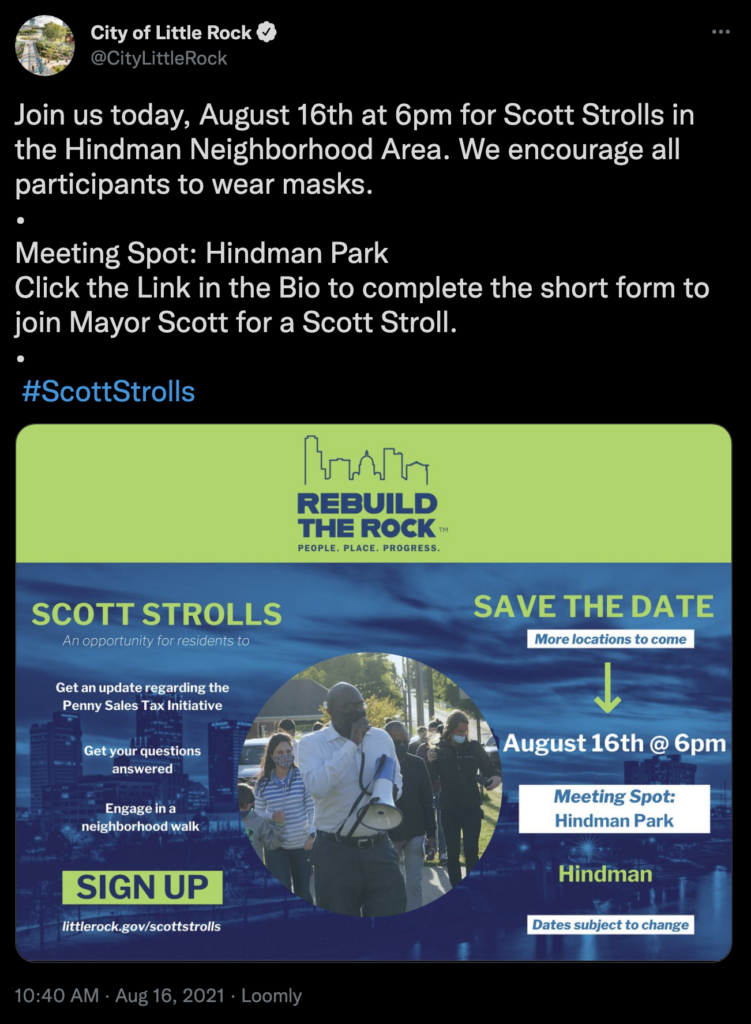
If you click the link in the bio, as the Tweet instructed, you are taken to the aforementioned website, where there is an online form to fill out if you want to participate in one of these strolls.
I was curious about what kind of interest folks had shown in the Scott Strolls, so, on August 17, I sent a FOIA request to the City of Little Rock’s FOIA Coordinator4, requesting electronic copies of “All applications for any Scott Strolls submitted through this website: https://www.littlerock.gov/city-administration/mayors-office/scott-strolls/.”
The coordinator confirmed receipt of the request a short time later on August 17. When a week passed and I still hadn’t received any records, I followed up and told them to provide the records or get sued. On August 25, I got this email from the coordinator, claiming that Scott had said no records existed:

This seemed odd to me. They had been promoting the website with every announcement of an upcoming stroll, so how could there be no records of anyone using it? I told the coordinator that I didn’t believe that excuse, and I sent a follow-up FOIA request on that same day, stating, “Pursuant to the AFOIA, provide electronic copies of all communications with any person selected to participate in a Scott Stroll.”
The next day, I received this response from the City, again saying that Scott had stated that there were no responsive records:

No records. No records of anyone ever submitting the web form. No records of the City ever communicating with any person about Scott Strolls. That was Frank Scott, Jr.’s official position.
Imagine my surprise, then, on September 3, when a background source sent me a PDF with over 80 records that should have been supplied to me by Mayor Scott as being responsive to my August 17 request. For example, this one:
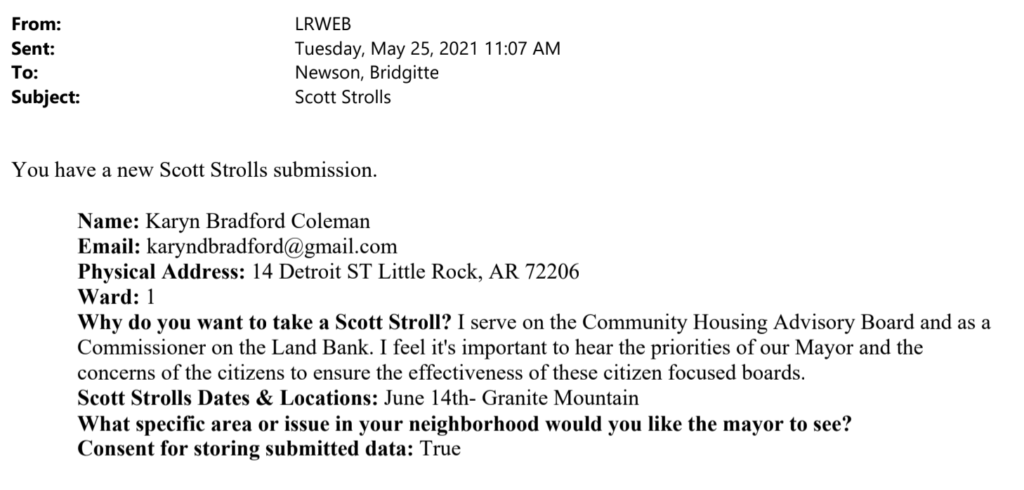
And this one:
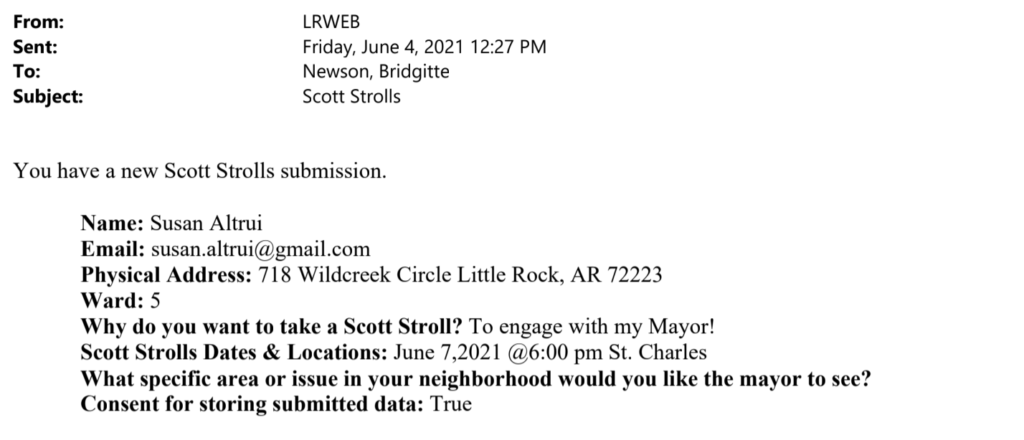
And literally almost 80 more records just like those, where someone had gone to the website, filled out the form, and submitted it to the city to apply to be part of a Scott Stroll. In other words, nearly seven dozen records that were exactly what I had asked Mayor Scott to provide under the FOIA and that he dishonestly claimed did not exist.
But wait, there’s more!
The PDF also included multiple records that Mayor Scott should have provided to me as responsive to my August 26 request for communications with anyone about the strolls, including:
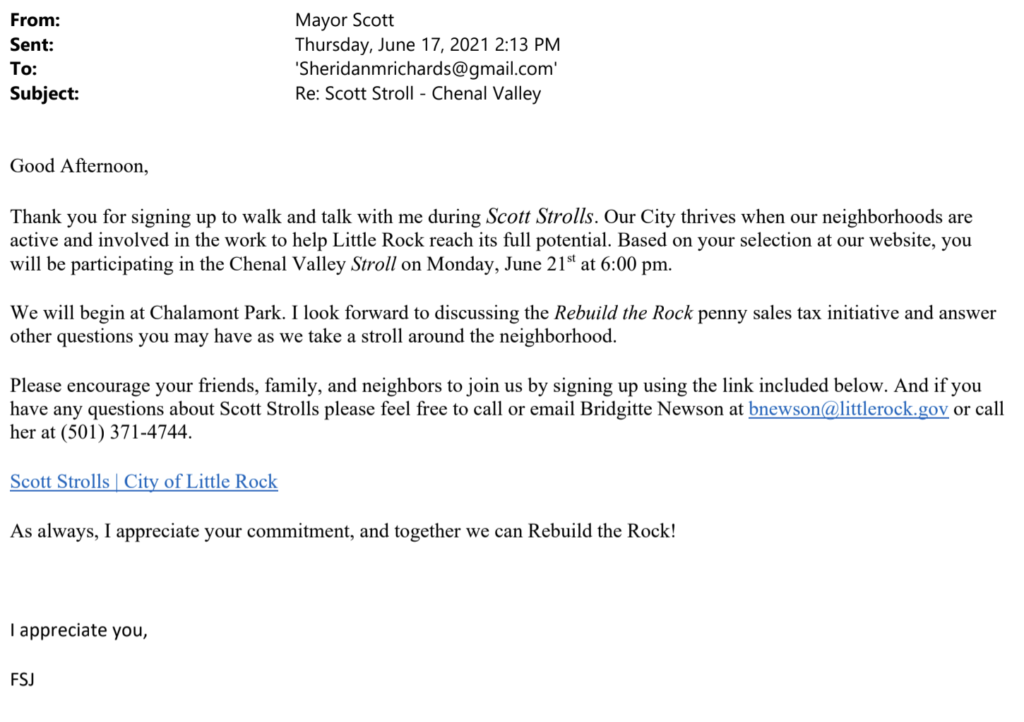
That is literally an email from Frank Scott, Jr., to a person who applied to participate in a Scott Stroll. It’s hard to come up with a record that would be more responsive to a request for “all communications with any person selected to participate in a Scott Stroll.” Yet, again, the Mayor had falsely said that there were no records responsive to my request, despite this record and several others being in existence.
To repeatedly tout “transparency” as one of your core beliefs and then respond to a FOIA request by lying about not having any records is already a bad idea.
To tell that lie to someone who (a) you know will continue to look for the records if only to see if you’re lying, (b) can and will sue you if you’re not telling truth, and (c) will publicly write about your lies is an even worse plan.
But to do all of that at the same time that you are using your name and reputation to try to pass a tax increase? That’s a level of hubris and dishonesty that is difficult to wrap one’s brain around.
Impressively (in a manner of speaking, at least), the lying from Scott’s camp was not finished. Later on the 26th, Kendra Pruitt–Senior Advisor to Mayor Frank Scott, Jr.– emailed me as well:
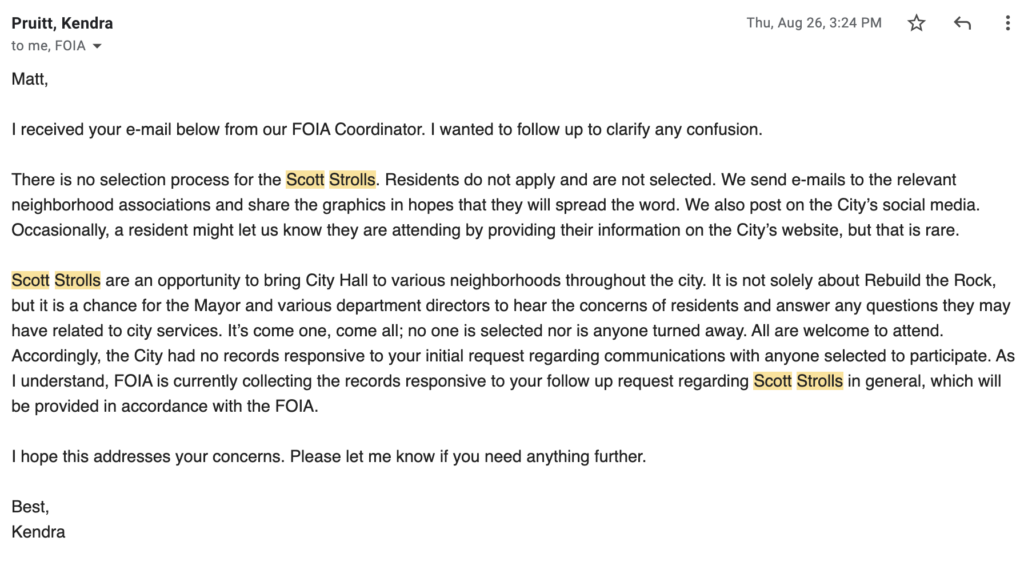
Now, while there’s no point in spending much time on Pruitt’s dishonesty, there are at least a few things in that email that warrant response.
First, there’s this: “There is no selection process for the Scott Strolls. Residents do not apply and are not selected. […] It’s come one, come all; no one is selected nor is anyone turned away.”
The Scott Stroll website literally says, “Complete the short form below to be considered for a Scott Stroll with up to 15 of your neighbors. All requests will be considered on a first come, first serve basis” (emphases mine). So…are you misleading the people who look at the website, or are you lying about the process? Because both scenarios cannot be true.
Second, she writes: “Occasionally, a resident might let us know they are attending by providing their information on the City’s website, but that is rare.”
Maybe your definition of “rare” differs from mine, but something happening eighty-plus times is not “rare.” More importantly, even if it only happened once, that record was still not provided to me in response to my FOIA request, so I’m not entirely sure what her point here was other than be disingenuous about the entire thing.
Finally, Pruitt states, “Accordingly, the City had no records responsive to your initial request regarding communications with anyone selected to participate.” That would be a meaningful sentence if I had asked for “communications with anyone selected to participate,” but that’s not what I requested. I specifically asked for “All applications for any Scott Strolls submitted through” the website. I said nothing about communications with people or people being selected; I only asked for the submitted forms, and we have confirmed that dozens of those records existed.
It is unclear whether Pruitt is uninformed about what’s going on (in which case her email is even more pointless than it seems at first glance) or she is knowingly being dishonest about the response to my first request. In either scenario, however, her email is a ridiculous waste of time.
I am aware that Frank Scott, Jr., is popular among Little Rock residents in general. Hell, I voted for the guy,5 so I get the desire to want to believe that he’s doing his best. We want to believe in his ACT plan, that he and his administration will be “accountable, clear, and transparent,” because that sounds different than what we’ve grown accustomed to from city government over the past decade. But what Scott (or any politician) does speaks far more loudly to me than what he says, and lying multiple times about records in response to a FOIA request says way more about how much he values transparency than any cutesy acronym does.
Look, I am not going to tell anyone how to vote on the one-cent tax issue. That’s not the point of this post, and I strongly believe that you should always vote however you want on this or any other issue. If you support the plan and trust that it will be implemented in an efficient and transparent manner, vote YES. I get it.
That said, I’m voting NO specifically because the man who is the face of that tax proposal has shown me that he will repeatedly lie to me, even if those lies mean he’s knowingly breaking the law. I just fundamentally cannot support someone who would do that, nor can I trust him enough to support his proposals.
Or, as Det. Bunk Moreland more succinctly put it: “A man must have a code.”
Long story short, Bell had lied about Mouzone to Omar Little in the hopes that Little would kill Mouzone. It didn’t work.↩
Wood Harris’s ability to convey a wide range of emotions in short order without ever saying a word is one of the most underrated parts of that fantastic show.↩
Or, in Bodie’s tragic tale, getting suspected of being caught in a lie.↩
A thoroughly useless position that is a waste of tax money.↩
In the run-off, not in the general election.↩